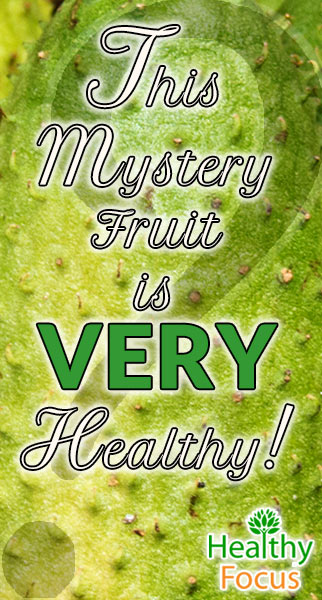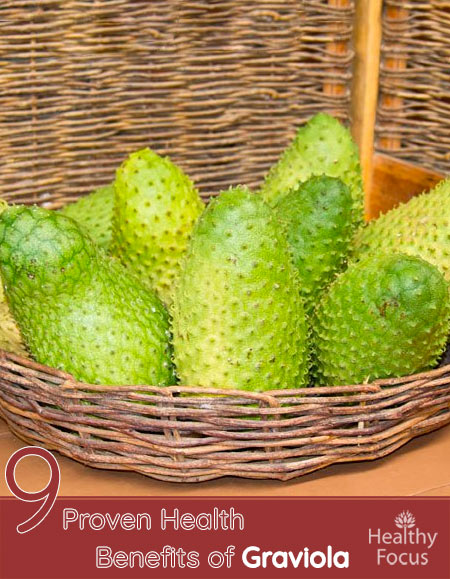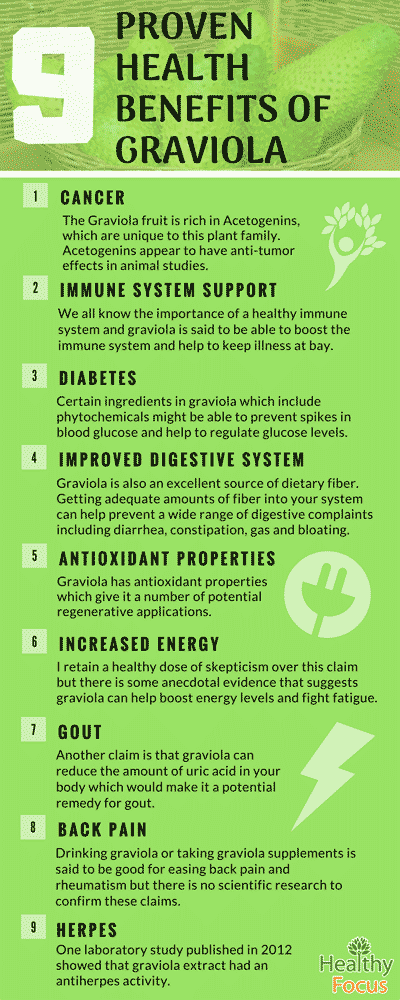Last Updated on April 3, 2019 by Marc Seward
What is Graviola?
The Amazon is one of the most diverse regions of the world containing an endless amount of plant life much of which has plenty of therapeutic benefits.
One such tree is the Graviola tree (Annona muricata) which produces a small, prickly green fruit long enjoyed and prized for its many health benefits.
You may not have heard of graviola or you may be familiar with one of its alternative names; soursop, cherimoya or guanabana.
Graviola is a fruit tree which grows in Central and South America and its fruit, leaves, and bark have all been used traditionally to treat a range of health disorders from rickets to diabetes.
Some more recent research points to its potential ability to fight cancer.So what makes graviola such a desirable and beneficial plant and is it really the superfood that many claim it to be?
The graviola fruit is a rich source of vitamins B1 and B2 and also vitamin C. The fruit also possesses a number of healthy and essential minerals such as calcium, zinc, potassium magnesium and phosphorus.
It is not only the fruit that is good for you; the bark, leaves and the stem are a great source of antioxidant which helps your body to repair the damage inflicted on its cells by infamous free radicals.
Considering its rich and healthy content, it is not surprising that graviola has been consumed for so many years by certain South American cultures.
It might have taken a while, but the Western world is now beginning to catch on to the benefits of Graviola. Graviola has also caught the eye of researchers and it is now increasingly available in several different forms.
Traditional Graviola Uses around the World
Graviola has been used extensively in certain areas of the world and its traditional uses include the following:
- In Peru
The leaves are brewed and used to treat inflammation of the mucous membrane and to help get rid of mucus in the nose, throat or lungs. - In the Amazon region
The root and the leaves of the Graviola tree are used to control blood sugar levels in diabetic patients. - In the Caribbean
Tea is made from the leaves of the tree for coughs, flu symptoms, and asthma. Breastfeeding mothers make sure they eat its fruit to promote milk production. - In many parts of South America
The juice is used to treat dysentery and scurvy while the bark and roots are used as a sedative.
Facts About Graviola
- Graviola is known by several different names. Some of the most common are soursop, pawpaw, and guanabana.
- The graviola fruit is very large and can weigh as much as 15 pounds – that is a hefty fruit.
- Graviola pulp is commonly used in salads and fruit cups in tropical parts of South and Central America.
- Graviola is very rich in antioxidants as well as vitamin C and B vitamins.
- Graviola contains compounds called Annonaceous acetogenins which are unique to the family and may possess antitumor properties.
- Much of the research into the effects of graviola has focused on the fruit’s ability to prevent cancer.
- Graviola is a healthy fruit that may even help you shed some weight as part of an overall diet plan. One cup of the pulp contains around 148 calories and its fat content is minimal.
- Graviola is also a great source of fiber which can help satiate your appetite. A single cup contains around 7.5 grams of dietary fiber which is far higher than a serving of bran cereal or an apple.
- The fruit is also a good source of various essential minerals including magnesium, potassium, phosphorus, and iron.
 Modern Uses of Graviola
Modern Uses of Graviola
While there has been a relatively large amount of laboratory research into the potential of graviola for cancer, many of the other benefits listed below are based on anecdotal and traditional use. Scientific research into the therapeutic benefits of graviola is slim and the information given below is not meant to replace medical opinion.
Cancer
Much of the recent literature related to graviola has been inspired by recent research into its ability to fight cancer.
The Graviola fruit is rich in Acetogenins, which are unique to this plant family. Acetogenins appear to have anti-tumor effects in animal studies.
According to its advocates, the graviola extract has been effective against several types of cancer including breast and liver cancer cells though up to now there has been no human research to confirm preliminary studies. (1)
However, laboratory and animal tests have shown a lot of early promise and seem to support its traditional use in the treatment of cancer.
Research into the anti-cancer potential of graviola has demonstrated several potentially worthwhile findings. (2) (3)
It must be noted that no trials have ever been conducted on humans and the FDA have not approved its use as a cancer treatment.
The best known and most comprehensive studies were carried out by the Purdue University’s School of Pharmacy and Pharmaceutical Sciences and these claims that you can find quite easily with a Google search can be summarized as follows.
- It has the ability to target and destroy malignant cancer cells in 12 different types of cancer.
- Certain of its compounds were many times more powerful in slowing cancer cell growth than the commonly used chemotherapy drug; Adriamycin.
- Graviola extract is selective. It only kills cancer cells and leaves healthy cells unharmed.
More clinical research is certainly necessary to confirm these claims and we can only hope that it will happen in the future. In any case, talk to your doctor if considering taking Graviola as a supportive therapy.
Immune System Support
We all know the importance of a healthy immune system and graviola is said to be able to boost the immune system and help to keep illness at bay. Those with a weak immune system like people recovering from illness and undergoing cancer treatment might benefit from graviola. A boost in immunity can keep your body strong and help prevent common illnesses like the cold and the flu.
Diabetes
Graviola has been used for centuries in South America to regulate blood sugar levels in diabetic patients and there is some preliminary modern research that suggests it might well be effective.
Certain ingredients in graviola which include phytochemicals might be able to prevent spikes in blood glucose and help to regulate glucose levels.
In one study published in 2008, diabetic rats given graviola for a two week period demonstrated near normal blood sugar levels by the end of the trial without being treated with any other diabetes medication. (4)
Another study showed that diabetic rats fed with graviola also exhibited higher antioxidant levels in the blood as well as healthier livers and a reduced level of unhealthy blood fats. (5)
Improved Digestive System
Graviola has antiviral and anti-parasitic properties and has been traditionally used to promote digestive health. Graviola might be used to treat constipation, diarrhea and promote regular bowel movements. Graviola fruit is also eaten traditionally to eradicate intestinal worms and other parasites.
Graviola is also an excellent source of dietary fiber with a single cup of its pulp containing more than seven grams of fiber.
Getting adequate amounts of fiber into your system can help prevent a wide range of digestive complaints including diarrhea, constipation, gas and bloating.
And that is not the only way you can benefit. If you are trying to lose a few pounds, then high-quality fiber of the type found in graviola can help to satiate your appetite meaning you will eat less throughout the day. In the long term, this can help you to lose weight.
There is also evidence that dietary fiber can improve your heart’s health and reduce the risk of heart disease while it may even help protect you from cancer.
Antioxidant Properties
Graviola has antioxidant properties which give it a number of potential regenerative applications. It can help prevent and repair cell damage and reverse some of the telltale signs of aging such as wrinkles and other skin blemishes.
Not only do antioxidants help you look better but they play a huge role in protecting you from serious disease caused by oxidative stress.
We encounter free radicals on a daily basis in the environment and in our food. free radicals can wreak havoc on your health so it is important to get as many antioxidants into your system as possible.
Antioxidants help to neutralize the damaging effects of these free radicals and can protect the cells from damage and disease.
Increased Energy
I retain a healthy dose of skepticism over this claim but there is some anecdotal evidence that suggests graviola can help boost energy levels and fight fatigue.
Gout
Another claim is that graviola can reduce the amount of uric acid in your body which would make it a potential remedy for gout. Anybody that has ever suffered from gout will know just how painful the condition can be. Any natural help would come as a huge relief to sufferers.
Back Pain
Drinking graviola or taking graviola supplements is said to be good for easing back pain and rheumatism but there is no scientific research to confirm these claims.
Herpes
There is evidence from research that graviola may help to treat herpes. Herpes is a common viral infection which is caused by a virus called herpes simplex. The symptoms of the virus include blisters or ulcers in the mouth or genitals. Other symptoms include vaginal discharge, pain during urination and cold sores.
Several studies indicate that graviola may be an alternative treatment for herpes simplex. One laboratory study published in 2012 showed that graviola extract had an antiherpes activity. (6)
A study done back in 1999 demonstrated that graviola might be effective against the herpes simplex 2 (HSV-2) virus. This virus is responsible for the majority of genital herpes cases. In vitro experiments indicated that graviola extract was deadly to the HSV-2 cells. (7)
Graviola Pros and Cons
Pros
- Graviola is rich in vitamins and healthy minerals.
- The fruit is low in calories and fat but high in protein and fiber.
- Research suggests that it may help prevent cancer.
- Graviola is a good source of antioxidants which help fight oxidative stress and disease.
- Graviola is suitable for diabetics.
Cons
- The fruit is not easy to get hold of outside of South America.
- As regards supplements, not every expert is convinced of Graviola’s anticancer potential.
- There are concerns that graviola supplements may affect the brain’s nerves and cause mobility issues similar to those seen in Parkinsonism.
How to take Graviola?
Graviola is available in supplementary capsule and liquid forms, make sure that you read the label thoroughly to determine the correct dosage. If you can get hold of the fruit itself, it is easy to prepare and can be enjoyed in any number of ways.
Graviola fruit usually has a delicious, slightly sour taste (hence the name soursop), which is quite difficult to pinpoint. You might get hold of a sweeter variety that some people compare to a combination of banana, papaya, and pineapple. When ripe simply remove the black seeds and scoop out the pulp. You can enjoy the fruit itself or add it to your smoothie or juice recipe.
Warnings and Possible Side Effects of Graviola
- Make sure that you consult with your doctor before taking any graviola supplements
- Women who are pregnant or breastfeeding should not take graviola. There is no research into the safety of graviola supplements on babies or the unborn fetus.
- WebMD warns against taking graviola supplements because it might kill the brain’s nerve cells and cause mobility problems similar to the movement problems associated with Parkinson’s.
Research References
(1) http://www.ncbi.nlm.nih.gov/pubmed/21767082
(2) http://www.ncbi.nlm.nih.gov/pubmed/23889049
(3) http://www.ncbi.nlm.nih.gov/pubmed/22475682
(4) http://www.ncbi.nlm.nih.gov/pubmed/20162043
(5) http://www.ncbi.nlm.nih.gov/pubmed/24076471
(6) http://ijppsjournal.com/Vol4Issue2/3297.pdf
(7) https://www.ncbi.nlm.nih.gov/pubmed/10446015


Leave a Reply
You must be logged in to post a comment.